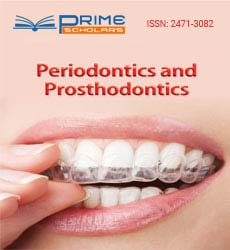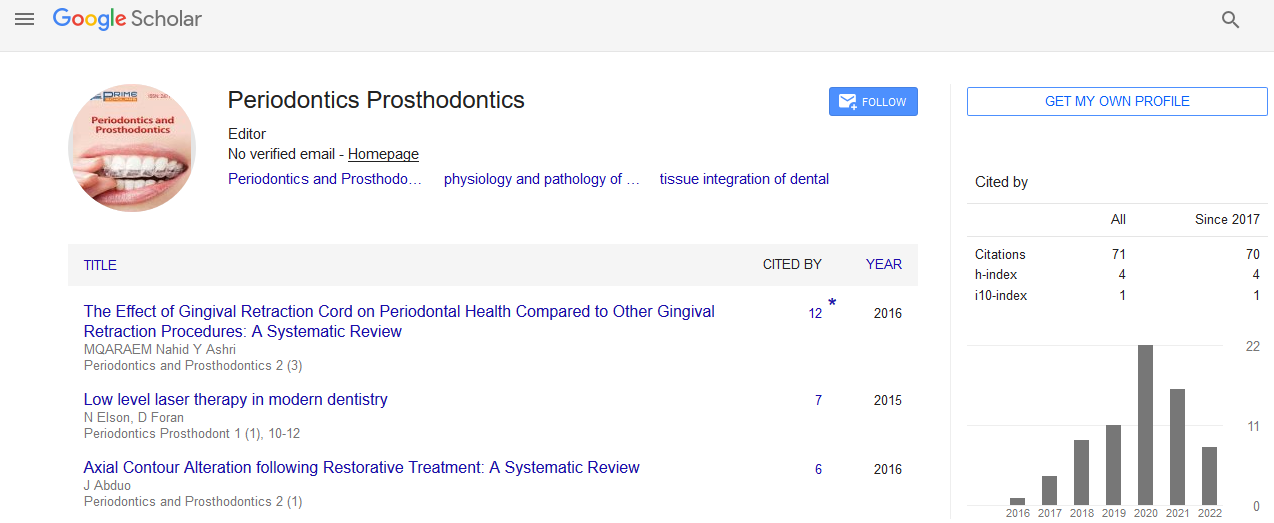Opinion - (2024) Volume 10, Issue 3
The Role of Prosthodontics in Enhancing Quality of Life
Katherine Rodriguez*
1Department of Prosthodontics, University of California, USA
*Correspondence:
Katherine Rodriguez, Department of Prosthodontics, University of California,
USA,
Email:
Received: 02-Sep-2024, Manuscript No. IPPDPD-25-21141 ;
Editor assigned: 04-Sep-2024, Pre QC No. IPPDPD-25-21141 (PQ);
Reviewed: 18-Sep-2024, QC No. IPPDPD-25-21141 ;
Revised: 23-Sep-2024, Manuscript No. IPPDPD-25-21141 (R);
Published:
30-Sep-2024, DOI: 10.36648/2471-3082.24.10.24
INTRODUCTION
Prosthodontics, the dental specialty focused on the design, creation, and placement of dental prostheses, plays a pivotal role in restoring function and aesthetics for patients with missing or damaged teeth. The impact of prosthodontics extends beyond oral health, significantly contributing to the overall quality of life by improving the ability to eat, speak, and smile confidently. This article examines the role of prosthodontics in enhancing patient well-being and discusses the latest advancements in prosthodontic treatment options. Prosthodontics not only addresses the immediate functional and aesthetic concerns of tooth loss but also plays a crucial role in preventing further oral health complications. For instance, well-fitted prostheses can help distribute bite forces evenly, reducing the risk of additional tooth wear or Temporomandibular Joint (TMJ) disorders.
DESCRIPTION
The loss of natural teeth, whether due to trauma, decay, or disease, can have profound effects on a person’s life. Beyond the obvious impact on oral function, tooth loss can lead to reduced self-esteem, social anxiety, and even depression. Prosthodontics offers solutions that address these challenges, providing patients with functional and aesthetically pleasing restorations. The most common prosthodontic treatments include dental implants, bridges, dentures, and crowns. Each of these options has its own set of indications, benefits, and limitations, and the choice of treatment is highly individualized based on the patient's specific needs. Dental implants, often considered the gold standard in tooth replacement, provide a long-lasting solution that mimics the function and appearance of natural teeth. Implants are anchored directly into the jawbone, which helps preserve bone density and prevent the facial changes associated with tooth loss. Advances in implant technology, such as the development of biocompatible materials and improved surgical techniques, have increased success rates and expanded the range of patients eligible for implant treatment. For patients who are not candidates for implants, bridges and dentures offer alternative solutions. Bridges, which involve the placement of a prosthetic tooth supported by adjacent natural teeth or implants, are an effective way to replace one or more missing teeth. Dentures, either full or partial, provide a removable option for patients with multiple missing teeth. Modern dentures are more comfortable and natural-looking than ever before, thanks to improvements in materials and manufacturing techniques. Crowns, often used in conjunction with other prosthodontic treatments, restore the function and appearance of damaged teeth. They are typically made from porcelain, ceramic, or metal and can be customized to match the patient’s natural teeth. The impact of prosthodontics on quality of life extends beyond the physical restoration of oral function. By improving the appearance of the smile, prosthodontic treatments can boost self-confidence and enhance social interactions. This psychological benefit is particularly important for patients who have experienced significant tooth loss or dental trauma.
CONCLUSION
Prosthodontics is a vital component of comprehensive dental care, offering solutions that restore both function and aesthetics for patients with missing or damaged teeth. The advancements in prosthodontic materials and techniques have made it possible to provide personalized treatment plans that meet the unique needs of each patient, significantly enhancing their quality of life. By addressing both the physical and psychological aspects of tooth loss, prosthodontics contributes to better oral health, improved self-esteem, and a higher overall sense of well-being. As the field continues to evolve, the potential for prosthodontic care to positively impact patient lives will only grow.
Acknowledgement
None.
Conflict Of Interest
The author’s declared that they have no conflict of interest.
Citation: Rodriguez K (2024) The Role of Prosthodontics in Enhancing Quality of Life. Periodon Prosthodon. 10:24.
Copyright: © 2024 Rodriguez K. This is an open-access article distributed under the terms of the Creative Commons Attribution License, which permits unrestricted use, distribution, and reproduction in any medium, provided the original author and source are credited.

